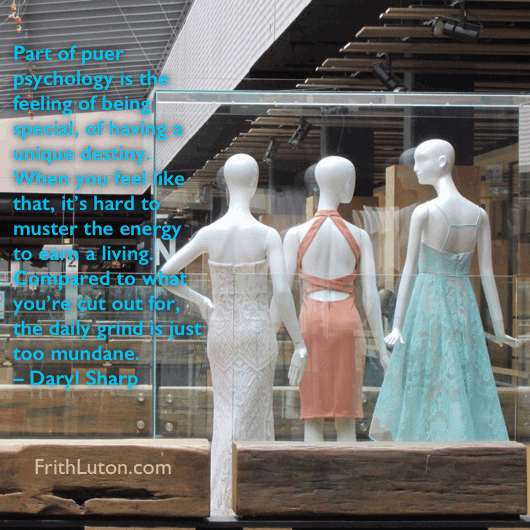The lovely apparition of the puer aeternus is, alas, a form of illusion. In reality he is a parasite on the mother, a creature of her imagination, who only lives when rooted in the maternal body. – Carl Jung, CW 5, par. 393
The expression puer aeternus is Latin for ‘eternal boy.’ In Greek mythology it designates a child-god who is forever young, like Iacchus, Dionysus, Eros. The theme is immortalised in the modern classics Peter Pan and The Picture of Dorian Gray.

In Jungian psychology, the term ‘puer’ is used to describe an adult man whose emotional life has remained at an adolescent level, usually coupled with too great a dependence on the mother. The term ‘puella’ is used for a woman, though one also speaks of a woman with a puer animus—a father’s daughter. [See Marion Woodman, The Pregnant Virgin: A Process of Psychological Trans- formation, esp. pp. 35ff.] The puer/puella syndrome is not an issue in one’s early years, because the symptoms then are age-appropriate, but many psychological crises in later life arise from the inner need to grow out of this stage.
The typical puer does not look his age and is proud of it. Who would not be, in a culture where youth is valued more than old age? Any man would be shocked at the suggestion that his youthful appearance derives from emotional immaturity; ditto women.
Description of a Puer
Here is how a modern novelist describes her experience of puers [Marsha Norman, The Fortune Teller, pp. 116f]:
Fay knew about men who wouldn’t grow up, and she wished she could tell Lizzie [her daughter], warn her. But she knew Lizzie wouldn’t listen any more than she had listened.
A man like this is so wildly attractive, so maddeningly alive, that he is absolutely irresistible. In the Tarot deck, he is the Fool …
In the picture on the card, the Fool, like a hobo, carries a sack tied to a stick. They leave you, these men, but they never said they were staying, never said they were committed, or purposeful—or responsible, even. All they want is to have a good time. And what’s wrong with that? Nothing, except you begin to wonder how interested you are in just having a good time. …
The joy of being with these men is the giddy return, through them, to a child’s world, where there are no clocks and no claims on your time, no clothes to be kept clean, and no consequences to be considered. Days and nights are filled with the silliness, the spontaneity, the conspiratorial privacy, and all the breathless secret pleasures of life in a tree house. …
They don’t always come home, and they won’t even apologise for it; won’t help around the house because they like it all messed up. They won’t work very hard because they don’t want to get trapped by success. And they won’t work at the relationship because it’s not supposed to be work, it’s supposed to be fun. If you don’t want to play with them, they don’t mind. But that isn’t going to stop them from playing.
Somehow, they make you feel very old, these men. They turn you into their mother.
Of course, not every woman finds such men ‘wildly attractive,’ much less irresistible. Why not? Well, following the natural ‘law’ – that we see in others traits of our own of which we are unconscious (the essence of projection) – women who fall for puers are themselves quite likely to be puellas. And, as it happens, vice versa.
The typical puer shirks responsibility for his actions, and understandably so, since what he does is not within his conscious control. He is at the mercy of his unconscious, and is especially vulnerable to his instinctive drives. He is prone to do what ‘feels right.’ However, he is so alienated from his true feelings that what feels right one minute often feels wrong the next.
The individuating puer—one coming to grips with his attitudes and behaviour patterns—knows that undifferentiated feelings are highly suspect, especially when they arise in conjunction with the use of alcohol or other drugs. Instead of identifying with his feelings, he tries to keep some distance from them, which means objectifying what he is experiencing. He questions himself:
Is this what I really feel?
Is this what I want? What are the consequences? Can I live with them?
Can I live with myself?
How does what I do affect others?
Puer Commitment
Puers generally have a hard time with commitment. They like to keep their options open and can’t bear to be tied down. They act spontaneously, with little thought of consequences. The individuating puer has to sacrifice this rather charming trait—but what he sacrifices then becomes part of his shadow. In order then not to become an automaton, ruled by habit and routine, he will have to reassimilate—this time consciously—his lapsed puer characteristics.
Also symptomatic of puer psychology is the feeling of being special, of having a unique destiny. When you feel like that, it’s hard to muster the energy to earn a living. Compared to what you’re cut out for, the daily grind is just too mundane. This is a variety of inflation. You feel special, so why, you ask yourself, am I doing something so ordinary?
If this attitude persists, you can cheerfully rationalise wasting your life, waiting for destiny to catch up—or fall from the sky. You play the lotteries and buy stocks. You know the odds are against you but you cross your fingers and hope you’ll win. Then hedge your bets with options and silver futures.
Puers and puellas live a provisional life. There is always the fear of being caught in a situation from which it might not be possible to escape. Their lot is seldom what they really want; they are always ‘about to’ do something, to make a change; one day they will do what is necessary—but not just yet. They are awash in a world of “maybe”: “Maybe I’ll do this … maybe I’ll do that …” Plans for the future come to nothing. Life slips away in fantasies of what will be, what could be, while no decisive action is taken to change the here and now.
The Provisional Life
The provisional life is a kind of prison. The bars are the parental complexes, unconscious ties to early life, the boundless irresponsibility of the child. Thus the dreams of puers and puellas are full of prison imagery: chains, bars, cages, entrapment, bondage. Life itself, reality as they find it, is experienced as imprisonment. They yearn for independence and long for freedom, but they are powerless to pull it off.
Puers chafe at boundaries and limits and tend to view any restriction as intolerable. They do not realise that some restrictions are indispensable for growth. This is expressed in the I Ching, the Chinese book of wisdom, as follows:
Unlimited possibilities are not suited to man; if they existed, his life would only dissolve in the boundless. To become strong, a man’s life needs the limitations ordained by duty and voluntarily accepted. The individual attains significance as a free spirit only by surrounding himself with these limitations and by determining for himself what his duty is. [Hexagram 60, ‘Limitation,’ in Richard Wilhelm, trans., The I Ching or Book of Changes]
Indeed, it is a lucky puer or puella whose unconscious eventually rebels and makes its dissatisfaction apparent through a psychological crisis. Otherwise you stay stuck and shallow.

The puer’s opposite number, or shadow, is the senex (Latin, ‘old man’): disciplined, conscientious, organised. Similarly, the shadow of the senex is the puer: unbounded instinct, disordered, intoxicated, whimsical. The puer’s mythological counterpart is the Greek god Dionysus, whose frenzied female followers—puella acolytes, so to speak—ripped men to pieces. Senex psychology is appropriately characterised by Saturn and the god Apollo: staid, rational, responsible.
It is said that the passage of time turns liberals into conservatives. Likewise, puers and puellas become old men and women, and, if they have learned from their experience, possibly even wise. But at any stage of life one must make a place for both puer and senex. In fact, whoever lives one pattern exclusively risks constellating the opposite. Enantiodromia is waiting in the wings: the more one-sided we are, the more likely it is that the opposite will break through to spin our lives around.
A healthy, well-balanced personality is capable of functioning according to what is appropriate at the time. That is the ideal, seldom attained without conscious effort and a psychological crisis. Hence analysis quite as often involves the need for a well-controlled person to reconnect with the spontaneous, instinctual life as it does the puella’s or puer’s need to grow up.
© from Daryl Sharp’s Digesting Jung, reproduced with kind permission of the author.